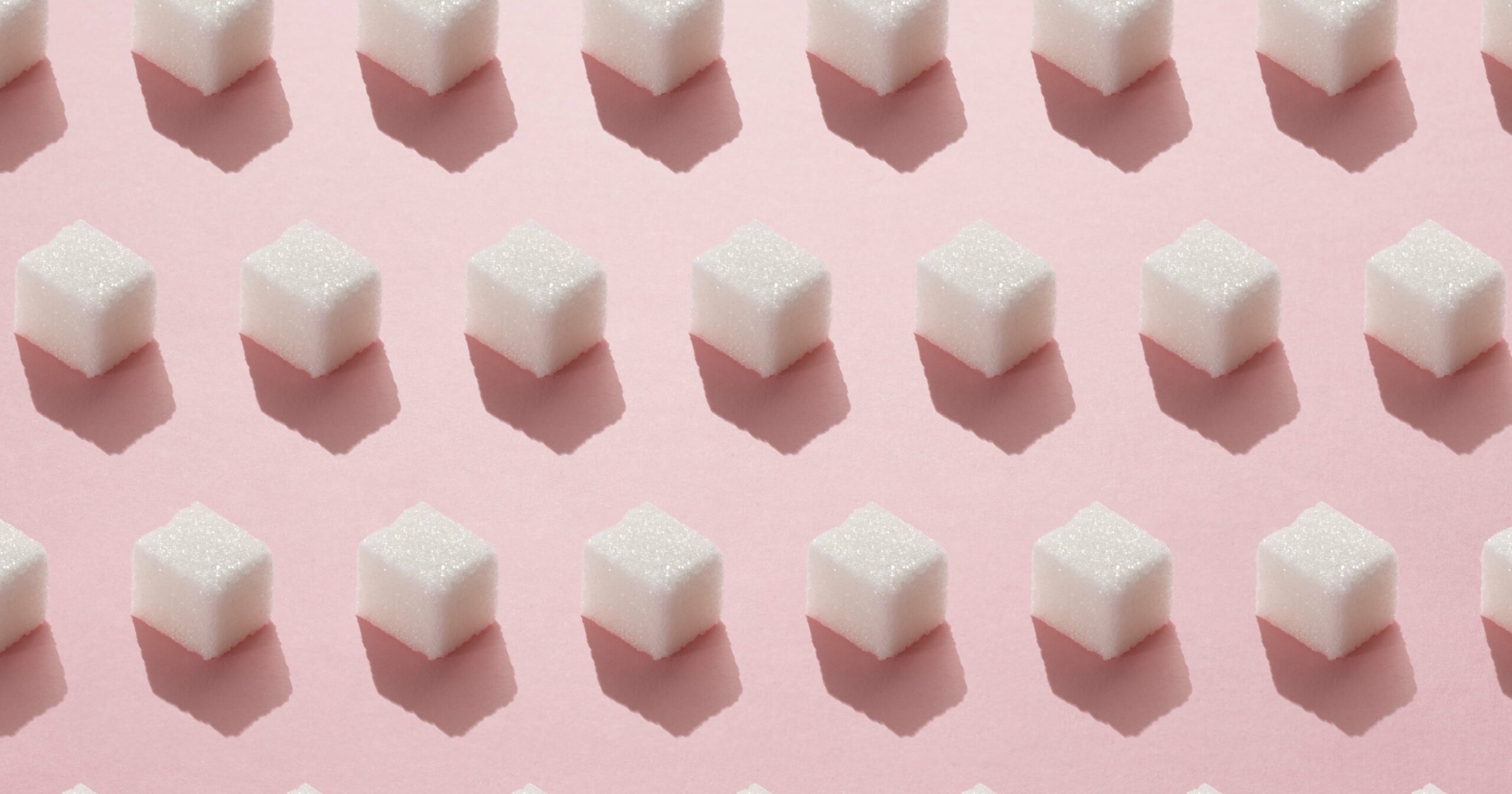Sugar is everywhere. It’s in our morning coffee, our afternoon snack, and our comforting dessert after a long day. But as sweet as it is, does sugar have a bitter side?
In moderation, sugar can be a harmless part of a balanced diet. However, when consumed in excess, sugar can have detrimental effects on overall health. It’s often implicated in weight gain and obesity, as it’s high in calories but lacks nutritional value. Moreover, excessive sugar consumption can lead to an increased risk of type 2 diabetes and heart disease, as it impacts blood glucose and cholesterol levels. Sugar’s impact on dental health is also well-documented, with it being a leading cause of tooth decay. Overconsumption of sugar may also impact mental health, according to some data. These health implications are why many experts advise being mindful of your sugar intake, aiming to limit the consumption of foods and drinks high in added sugars.
But that doesn’t mean the answer is black and white when it comes to whether or not sugar is bad for you. Whether you’ve wondered (and inevitably searched), “is cane sugar bad for you?” or “is added sugar bad for you?” – or something similar – let’s untangle the sticky truth about sugar and its effects on our health. Ahead, registered dietitians, myself included, weigh in on the positive and negative impacts of sugar.
Experts Featured in This Article:
Lauren Harris-Pincus, MS, RDN, is a registered dietitian and author of “The Protein-Packed Breakfast Club”.
Mary Ellen Philliips, MPH, RDN, LD is a registered dietitian and author of “The Easy Diabetes Cookbook”.
What Happens When You Eat Too Much Sugar
Picture this: you’re gobbling down that extra glazed doughnut and washing it down with a sugary frappuccino. For people without diabetes or other conditions that affect the pancreas or the body’s ability to secrete insulin, after your indulgence, your pancreas kicks its job into high gear by secreting insulin, a hormone that helps the body maintain blood sugar balance. For many healthy people, your body can respond to this sugar overload situation and bring your body back into balance.
But do this too often, and your body might just throw its hands up in despair and stop responding to insulin altogether, which can signal the onset of certain conditions like insulin resistance and diabetes. Having these conditions can make it easier for your body to experience high blood sugar, or hyperglycemia, a condition that can trigger a host of negative effects on the body. If left unchecked, high blood sugar can damage blood vessels, leading to heart disease, stroke, kidney disease, and poor blood flow. It’s also associated with nerve damage, often resulting in pain or numbness in the hands and feet.
Overindulging in sugar frequently can also put a strain on your liver, which can lead to non-alcoholic fatty liver disease, a condition usually reserved for heavy drinkers. It can also lead to an accumulation of belly fat.
Remember this – for generally healthy people, these negative effects are observed when excessive amounts of sugar are consumed, not an occasional treat as a part of a balanced and healthy diet. The American Heart Association recommends adult men limit their added sugar intake to 36 grams per day, and women stick to a maximum of 25 grams per day.
Is Sugar Bad For You?
Despite what some social media health influencers may tell you, consuming sugar as a part of a balanced and healthy diet isn’t going to harm you. While it is a widely held perception that sugar is detrimental to health, moderate and mindful intake can in fact be part of a balanced diet. Sugar, in moderate doses, can provide the body with the necessary energy for daily activities. And adding a little sugar to a nutritious food that can use some sweetness may help people consume vitamins and minerals that they may otherwise not consume.
However not all sugars are created equal. There are different types of sugar, with each having their own noteworthy call-outs.
Is Fruit Sugar Bad For You?
While all sugar should be consumed in moderation, the sugar found in fruit, known as fructose, is not inherently bad for you. Fruits are packed with essential nutrients, fiber, and antioxidants, which contribute to overall health. The fiber in fruit also slows the absorption of sugar into your bloodstream, preventing spikes in blood sugar levels.
“The fructose found in fruit is not considered added sugar when consumed as part of the fruit, and the bonus is all of the vitamins, minerals, phytonutrients, and antioxidants that accompany it,” says Lauren Harris-Pincus, MS, RDN, registered dietitian and author of “The Protein-Packed Breakfast Club”.
Is Cane Sugar Bad For You?
Cane sugar, also known as sucrose, is a natural sugar derived from the sugarcane plant. It is produced through a process of extracting juice from the sugarcane, and then purifying, evaporating, and crystallizing it. The result is a sweet, granulated substance often used as a sweetener in foods and beverages. Unlike its highly processed counterparts like high-fructose corn syrup, cane sugar retains some essential nutrients such as small amounts of vitamins and minerals.
“Cane sugar is typically used to sweeten processed foods or added to coffee, tea, baked goods, and more,” Harris-Pincus tells PS. “It provides sweetness and calories but no significant micronutrients so keeping the total consumption within the recommended daily limits is practical,” she shared.
Is Natural Sugar Bad For You?
“Natural sugar” is just sugar that naturally occurs in fruits or foods (think: brown rice or whole grain pasta). Depending on the source, your rise in blood sugar may be slightly slowed by other ingredients in the food or you may take in very small amounts of micronutrients, but it’s not always enough to be considered a health benefit, Harris-Pincus explains. Ultimately, natural sugars are considered safe, according to MD Anderson Cancer Center, but they should be consumed as part of a balanced diet. That being said, some foods also contain added sugar (i.e. processed foods) ,which should be more mindfully and moderately consumed.
Is Brown Sugar Bad For You?
Brown sugar is a type of sugar that is a blend of granulated white sugar and molasses. The presence of molasses gives brown sugar a deeper flavor and color compared to regular white sugar. It comes in two varieties: light and dark. The light brown version contains less molasses, resulting in a milder flavor. In contrast, dark brown sugar contains more molasses, giving it a stronger, more intense flavor. Brown sugar is extensively used in baking, sauces, and marinades due to its rich, complex flavor profile.
“Brown sugar provides a unique flavor and texture that may complement certain foods better than other sugar options,” says Harris-Pincus. But “it’s all about the company it keeps,” she warns. Eating copious amounts of brown sugar may not support overall health. But a small quantity in a healthy recipe is likely a-ok.
Symptoms of Too Much Sugar in Your Body
While what equates to “too much sugar” will vary by individual, there are certain signs and symptoms to look out for when it comes to excessive sugar intake. It can show up as frequent feelings of fatigue, increased hunger and thirst, unexplained weight loss or gain, frequent urination, dry mouth, and blurred vision. Additionally, high sugar levels can also cause mood swings, headaches, inflammation, and a heightened risk of dental cavities. It’s important to monitor sugar consumption and maintain a balanced diet to keep these symptoms at bay.
Harris-Pincus added that “eating too much sugar daily can crowd out nutrient-rich foods we need to help prevent lifestyle diseases like heart disease, diabetes, and cancer. For individuals with diabetes, excess sugar intake can make the disease harder to manage and lead to long-term complication.”
Which Is Worse: Sugar or Artificial Sweeteners?
Both sugar and artificial sweeteners have their own set of concerns and potential health impacts. Sugar, particularly in excess, can lead to weight gain, tooth decay, and increased risk of chronic diseases like heart disease and diabetes. On the other hand, artificial sweeteners, while calorie-free, can sometimes lead to weight gain and other health problems, but more data is needed to confirm this.
“It’s not a question of which is worse or which is best, but rather what is right for each person’s specific situation,” says Mary Ellen Phipps, MPH, RDN, LD, registered dietitian and author of “The Easy Diabetes Cookbook”. “Some people may prefer to use small amounts of real sugar to sweeten certain foods or beverages, but people living with diabetes may benefit more from using an artificial sweetener in moderate amounts,” she adds.
Ultimately, adding sweetness to your diet in moderate amounts can be acceptable, assuming your overall diet is balanced and relatively low in added sweeteners. If you are unsure which option you should choose or worries about your sugar intake in general, your best bet is to speak with a healthcare provider to help you land on the best choice for your needs.
Lauren Manaker is an award-winning registered dietitian and freelance writer who is passionate about providing evidence-based nutrition information in a fun and interesting way.




